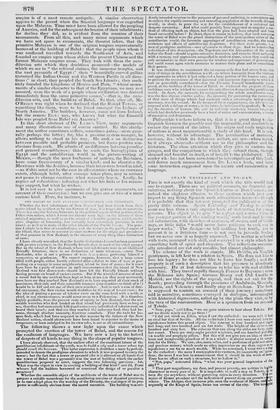SPAIN YESTERDAY AND TO-DAY.
THIS is not exactly the kind of work which the title would lead one to expect. There are no political accounts, no financial spe- culations, nothing about the Spanish Cortcs or Don CARLos, nor indeed the slightest allusion to thosi) matters which just now impart to any thing Spanish such adventitious interest—though it is probable that this interest prompted the publicati.n of do pretty little volume. Spain .1"e8tentay aml To-day is anther more nor less than a very superior book of in3tructioit for voting persons. The object is to give " in a clear iuul c)ncise fria, to the younger portion of the reading wotlil," such local and hi-tori- cal information, with sketches of manners, of scenes, and of huilib lugs, as little folks " would never have patience to seek out in larger works." The design—to tell nothing but truth, yet to present it in a fictitious form — is not new in juvenile books; but we never saw it so happily executed. The matter is selected with taste, arranged with skill, and couveyel in a style which has something both of spirit and elegance. The reflections occasion- ally introduced are not only sensible, but almost philosophic.
The scheme of the work is simple. Mr. Deville, an English gentleman, is left heir to a relation in Spain. He does not like to lose his legacy ; he does not like to leave his family ; and the property is of such a description that his presence is absolutely necessary. He at last determines to take his wife and children with him. They travel rapidly through France to Bayonne; cross the Bidassoa into Spain; traverse Biscay and Old Castile to Madrid; see the sights of the capital, and then set out for the South; proceeding through the provinces of Andalusia, Grenada, Murcia, and Valencia ; and finally stop at Barcelona. The book is supposed to contain an account of their journey; sometimes told in narrative, sometimes conveyed in dialogue, intermingled with historical digressions, called up by the place they visit, or by the turn of the conversation. Here is a specimen from au account of Toledo.
"Now, papa," said Ellen, " we are quite anxious to hear about Toledo. Did not we decide wisely nut to go there ?" "I did not think so, Ellen, when I saw the cathedral : we were told it had no rival but that of Seville. All the cathedrals I have ever seen shrink into in- significance before this grand object. The interior is four hundred aril eight feet long, and two hundred and six feet wide. The height of the aisles is ow hundred and sixty feet. The columns that run along the aisles are forty eight feet round. There are sixty-eight painted windows, and one hundred and bats, six marble and porphyry pillars. But this will not give you an idea of the so- lemn and inexpressible grandeur of it as a whole : it almost seemed a tit IT? tion fur the Deity. We saw, also, many relics, and a profusion of gold and silver and precious stones ; which made no other impression on me than regret at so injudicious a use fon so much wealth. While we remained, I went twi,e a day to the cathedral : the more I contemplated its vastness, its immensity an gran- deur, the inure I was lost in astonishment that it should be the work of math Time has no effect on such a structure, but to hallow it." "But, papa," reiterated Ellen, "what was your general impression of the city? 9, " That past maguifience, any dear, and present poverty, are written in k chile characters in every part of it. It is impossible to walk a step in Toledo, t to turn the eye anywhere, without perceiving rains in every direction. Th re- mains of former grandeur and the indication of present decay are present e where. The Alcarr, that immense pile, once the residence of Moors, an sequently of the Kings of Spain, forms one corner of the city. The irt




















 Previous page
Previous page